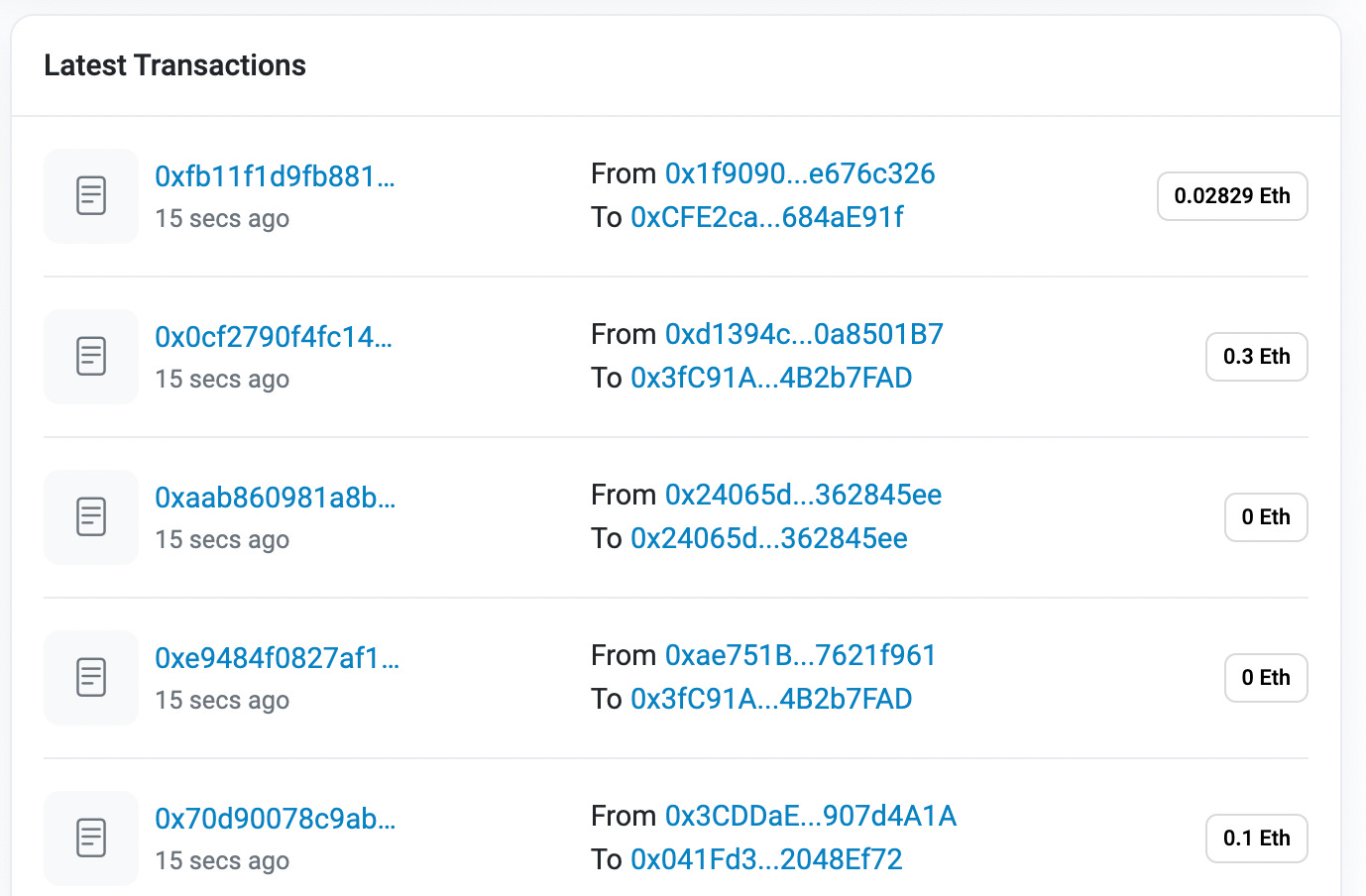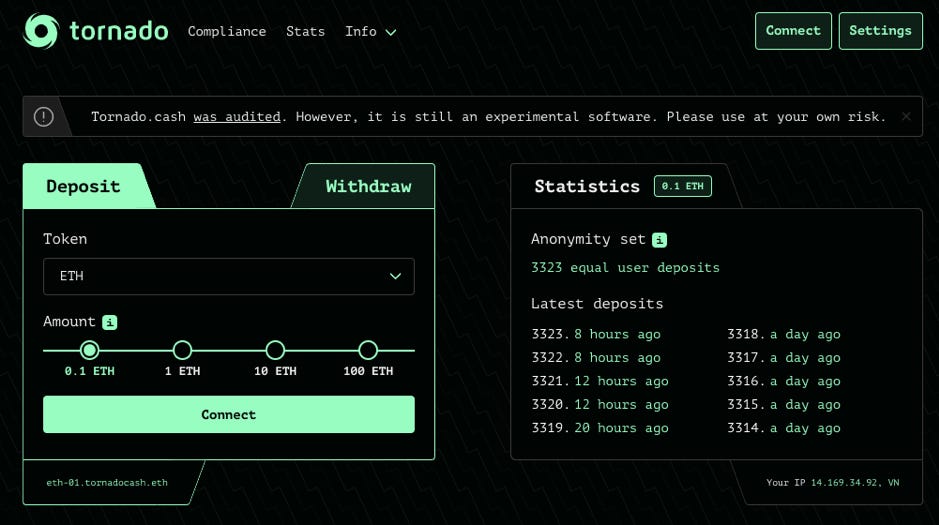Privacy in a world of Public blockchains
The importance of privacy as more of our lives become recorded publicly on-chain
TLDR:
Public blockchains save data in a pseudonymous way, this is not the same as data being private, data is public for everyone on the Internet to see!
As we store more data about ourselves on-chain we need to be wary about not turning blockchains into mass surveillance machines.
Privacy preserving technologies are crucial to avoid a dystopian future. Be wary of CBDCs and people against privacy preserving tech.
I’ve been writing this regular weekly Substack on Web3 for half a year now and have been involved in crypto for as long as 7 years, so naturally I’m a big proponent of blockchain technology and bringing more of the world on-chain.
In the last few months I’ve also been cooking up a 30 day course on “NFT Tech” that I’ve just finished the second draft of! I’m excited that it’s getting closer to being something I can release to the world. I genuinely believe tokenisation and bringing data on-chain through open and public blockchains will unlock a lot of value and benefits for the global economy.
However, it’s always important to take a step back and question things too. In particular, today I wanted to get a bit more philosophical and look at the risks on our individual privacy of putting more and more of our lives on public blockchains.
Public blockchains
We often think that what’s on-chain is miraculously hidden behind a bunch of 1s and 0s. The truth couldn’t be further away from this though. Blockchains like Bitcoin and Ethereum are by design both public, as anyone can read and write to them, and immutable, since their consensus algorithms ensure that once data is on-chain it cannot be re-written!
To compare, in traditional finance the assets people own are hidden in centralised databases of banks, exchanges and other financial institutions. To get an x-ray view into the world is hard, you need to have legal permission to access various private databases. Laws are in place to make the system more transparent, although by its very nature most of the data is hard to access.
But in Web3 this is actually the opposite. Everything that you put on the blockchain is entirely public and visible by everyone!
This is important to always remember!
On-chain data isn’t private
Sure you may be storing your tokens and NFTs on an Ethereum address with a bunch of weird numbers and letters like: 0x8e720F90014fA4De02627f4A4e217B7e3942d5e8.
But these addresses only provide pseudo-anonymity.
This can be easily illustrated with an example. If you have $10,000 in your bank account and you pay your landlord $1,000, he doesn’t know you have $9,000 left. Yet in Ethereum if you do the same, he can now associate your ETH address with you and will not only know that you have $9000 left, but he’ll also know all your financial history with that wallet including all the degenerate Web3 habits you picked up along the way flipping NFTs and tokens!
You may still get away with it if you have a few different wallets for different purposes, but that’ll likely only be hard for humans to decipher. For computers and the ever growing AI bots out there, this isn’t quite the same challenge as they can metaphorically “see through the Matrix” spotting patterns and understanding where you’ve been spending money.
As if this isn’t creepy enough to think about, technology will only get better and a decade from now your transactions will still be on the blockchain due to their immutability. By that point the technology will likely be able to translate all sorts of things you did in the past, meaning there will only be more and more transparency into our finances as time goes by.
In the good case it means 10 years from now you’ll be airdropped something for having once held an early NFT and being an OG in the space. In the bad case picture a holographic projection above your head showing what you’ve earned and spent for the past 10 years that anyone can access - now that’s pretty dystopian!
Ethereum is only a few steps away from being a huge financial surveillance machine!
This can be avoided though if privacy is given enough of a focus.
Privacy preservation
Privacy preserving technologies are an essential part of the space yet there are narratives being constructed to put them under attack. Tornado.Cash is a prime example! With Tornado.Cash you can “mix” your tokens so that its not clear what wallet they came from, meaning with the example before you can separate the money used to pay your rent from your “degen Web3” money into separate unassociated wallets.
However, Tornado.Cash has been sanctioned by OFAC and come under attack because it was supposedly used by North Korean hackers to launder money. Whether this is true or not, blanket attacks on privacy technology like this is as short-sighted as it would be to ban dinner knives because someone once used them to hurt someone.
Moreover, Central Bank Digital Currencies (CBDCs) are being tested around the world and represent the antithesis to financial privacy since they will allow Central Banks to know every single money movement you’ve ever done.
Most people in developed countries are not too concerned on a day-to-day basis about financial censorship, but you only need to look at countries with an authoritarian regime like Venezuela that have become impoverished for political reasons to understand that when things go wrong politically they can go very wrong. In these cases financial privacy can literally protect people from potential oppression in the hands of authoritarian regimes that single out and target political rivals.
As a big proponent of Web3, I believe privacy preserving technology on Bitcoin, Ethereum and other public blockchains must be central to all our conversations and we must be very vigilant so that CBDCs don’t overreach on our privacy. Nobody wants to live in a world where their hard earned money can simply be blocked or taken away from them!
As you navigate the growing space of Web3 and potentially develop your own smart contracts, projects, and businesses, always keep in mind this aspect of protecting financial privacy so we don’t find ourselves into a world where these powerful underlying blockchain technologies are coerced into financial censorship.
A final thought for today is that technologies are not inherently good or bad, it’s all about how we use them.




